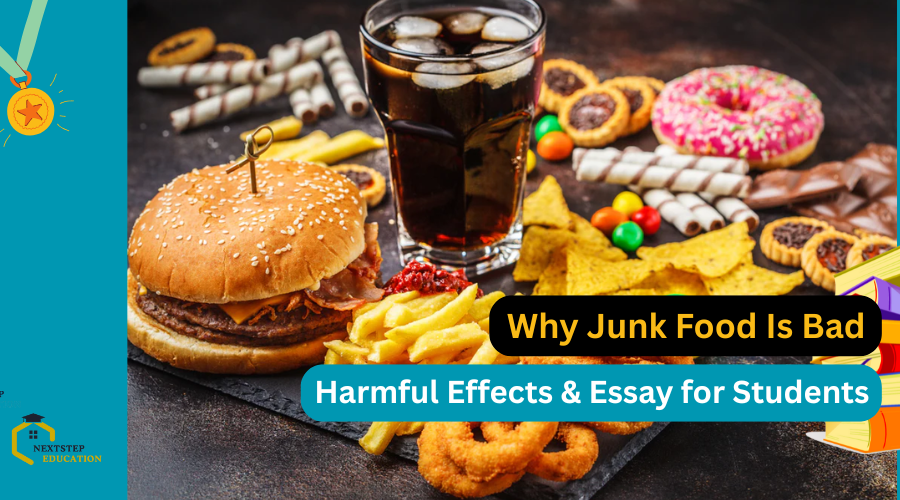Junk food has become an everyday part of modern life—easily available, reasonable, and compelling. From burgers and chips to soft drinks and sugary snacks, these foods are often chosen for their taste and comfort, especially among students and young people. However, behind the attractive flavors lies a serious concern for health and well-being.
This essay examines the harmful effects of junk food, focusing on its impact on both the body and mind. With rising health issues among children and adults alike, it is important to understand the long-term risks of regular junk food consumption and the need for healthier choices.
What Is Junk Food?
Junk food refers to food items that are high in calories but low in nutritional value. These foods often contain large amounts of sugar, salt, unhealthy fats, artificial additives, and preservatives. While they may satisfy desires quickly, they provide little to no essential nutrients like vitamins, minerals, fiber, or protein.
Common examples of junk food include soft drinks, chips, candy, instant noodles, deep-fried snacks, processed meats, and fast food like burgers and pizzas. These items are often designed to be restlessly palatable—meaning they’re hard to stop eating—even though they contribute to poor health when consumed regularly.
Why Junk Food Is Popular
Junk food is widely popular for several reasons, especially among children, teenagers, and working adults. Its convenience and instant gratification make it a go-to choice in today’s fast-paced world.
-
Easily Available: From street stalls to supermarkets and vending machines, junk food is everywhere.
-
Affordable: It’s usually cheaper than fresh, wholesome meals, making it attractive to students and families on a budget.
-
Tasty & Addictive: High levels of salt, sugar, and fat create a taste that many people desire again and again.
-
Aggressive Marketing: Advertisements, social media, and celebrity acceptance influence eating habits, especially in young minds.
-
Lack of Time or Awareness: Many people eat junk food simply because they don’t have the time to cook or are unaware of its long-term effects.
Though junk food may seem like a quick solution, its impact on health is far from harmless.
Harmful Effects of Junk Food on Health
While junk food may offer temporary satisfaction, its long-term effects on health are serious and sometimes irreversible. Regular consumption of junk food leads to multiple physical and mental health problems, including:
1. Obesity and Weight Gain
Junk food is high in calories and low in nutrition. Regular intake leads to fat collection, especially when mixed with a lack of physical activity. This increases the risk of childhood and adult obesity.
2. Heart Diseases
Excess saturated fats and trans fats in junk food raise bad cholesterol levels (LDL), which block arteries and increase the risk of heart attacks, high blood pressure, and stroke.
3. Type 2 Diabetes
Sugary drinks and snacks can cause blood sugar spikes. Over time, this puts strain on the pancreas, leading to insulin resistance and type 2 diabetes.
4. Digestive Problems
Junk food lacks fiber, which is essential for digestion. It can lead to constipation, acidity, and other stomach issues when consumed frequently.
5. Weakened Immunity
Poor nutrition affects the immune system. Junk food denies the body of essential vitamins and minerals needed to fight diseases and maintain energy.
Junk Food and Its Impact on Students
Students are among the most affected groups when it comes to junk food consumption. While it may seem like a suitable option during school breaks or late-night studies, its effects go far beyond just physical health.
1. Reduced Concentration and Memory
Junk food lacks essential nutrients like omega-3s, iron, and vitamins that support brain development. As a result, students may struggle with focus, memory retention, and academic performance.
2. Low Energy Levels
High-sugar foods give a quick energy spike but lead to a crash soon after, causing exhaustion, sluggishness, and reduced productivity.
3. Mood Swings and Anxiety
Processed foods may disrupt brain chemicals that regulate mood, leading to irritability, disquiet, and even symptoms of depression.
4. Poor Academic Habits
Frequent consumption of junk food can make students less disciplined about their routines, including sleep, exercise, and study schedules.
5. Long-Term Health Habits
Eating habits formed during childhood often continue into adulthood. A diet high in junk food at an early age increases the risk of lifelong health issues.
Junk Food vs Healthy Food – A Quick Comparison
To understand the true cost of junk food, it’s helpful to compare it directly with healthy food. While junk food offers instant taste and convenience, nutritious food provides long-term nourishment and well-being.
| Factor | Junk Food | Healthy Food |
|---|---|---|
| Nutritional Value | Very low (empty calories) | High in vitamins, minerals, protein, and fiber |
| Energy Source | Temporary (quick spikes and crashes) | Sustained and balanced energy |
| Health Impact | Increases the risk of diseases | Strengthens immunity and prevents illness |
| Satiety | Low – encourages overeating | High keeps you full longer |
| Additives | Loaded with preservatives, sugar, and trans fats | Natural or minimally processed ingredients |
| Cost (Long Term) | Cheap upfront, but expensive in health risks | More value in terms of health and longevity |
Eating healthy doesn’t mean giving up on taste. Many natural foods are delicious, satisfying, and energizing, without the harmful effects.
Long-Term Consequences of Junk Food Consumption
While the short-term effects of junk food may seem minor—like tiredness or indigestion—the long-term consequences can be severe and even life-threatening. Regular consumption leads to an incremental breakdown of physical health and mental well-being.
1. Chronic Diseases
Excessive intake of unhealthy fats, sugar, and sodium increases the risk of lifestyle diseases such as heart disease, diabetes, high blood pressure, and fatty liver.
2. Mental Health Decline
Studies have shown that a diet high in processed food can lead to anxiety, depression, and poor emotional regulation, especially in teenagers and young adults.
3. Weak Bones and Poor Growth
Junk food lacks calcium and other nutrients vital for bone development. In children and adolescents, this can lead to poor growth and low bone density.
4. Early Aging and Skin Issues
High sugar and oil content can lead to acne, skin dullness, and early aging. Nutrient-poor diets also affect hair, nails, and skin health.
5. Reduced Life Expectancy
A poor diet over time contributes to reduced overall life quality and increases the chances of early mortality due to health complications.
How to Reduce Junk Food Intake
Reducing junk food consumption doesn’t mean cutting out all your favorite treats overnight—it’s about making smarter choices and developing better eating habits over time. Here are some practical tips:
1. Plan Balanced Meals
Prepare meals at home using fresh ingredients. Include vegetables, fruits, whole grains, and protein to stay full and reduce cravings.
2. Keep Healthy Snacks Handy
Replace chips and cookies with options like nuts, fruits, yogurt, roasted chickpeas, or homemade granola bars.
3. Limit Screen-Time Snacking
Avoid eating while watching TV or scrolling on your phone, as it often leads to overeating junk food without awareness.
4. Read Food Labels
Look for ingredients and nutritional information before buying packaged foods. Avoid items high in sugar, sodium, and trans fats.
5. Stay Hydrated
Sometimes thirst is mistaken for hunger. Drinking water regularly can help reduce unnecessary snacking.
6. Educate and Involve Children
Teach kids about the effects of junk food and involve them in choosing or preparing healthy meals. This builds awareness from a young age.
Conclusion
While junk food may seem like a suitable and tasty option, its long-term impact on health is far from harmless. From weight gain and poor attention to chronic diseases and reduced life quality, the risks are significant, especially for growing children and busy students.
Understanding why junk food is bad empowers us to make better food choices. A balanced, nutritious diet not only boosts physical health but also supports emotional well-being and academic performance. By choosing healthier options and spreading awareness, we can protect ourselves and future generations from the hidden dangers of junk food.
Healthy habits begin with small steps—and those steps start today.
Frequently Asked Questions (FAQs)
Q1. What are the harmful effects of junk food?
Junk food can lead to obesity, diabetes, heart disease, digestive issues, and poor mental health. It also tires the immune system and contributes to exhaustion and low concentration.
Q2. Why is junk food especially bad for students?
Junk food affects brain function, reduces energy levels, and impacts mood and focus, directly harming academic performance and learning ability in students.
Q3. Is it okay to eat junk food occasionally?
Yes, eating junk food occasionally in small portions is generally acceptable if balanced with regular physical activity and a healthy overall diet. Moderation is key.
Q4. How does junk food affect mental health?
Junk food is linked to increased risk of anxiety, depression, and mood swings. Poor nutrition can disrupt brain function and emotional balance.
Q5. What are some healthy alternatives to junk food?
Healthy options include fruits, nuts, seeds, yogurt, whole-grain snacks, homemade smoothies, roasted snacks, and air-popped popcorn.





